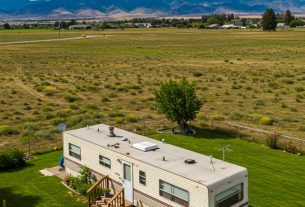As I sit here pondering the different forms of housing and travel options available, I can’t help but delve into a question that often arises among enthusiasts and casual observers alike: Is a mobile home an RV? Both mobile homes and recreational vehicles (RVs) offer unique lifestyles and flexibility, yet they serve different purposes and come with distinct characteristics. In this article, I will explore the differences between these two types of living arrangements, provide insights into their usage, and invite you to engage in this ongoing conversation.
Understanding Mobile Homes
Mobile homes, commonly referred to as manufactured homes, are prefabricated structures that are built in factories and transported to their permanent locations. I find it fascinating that mobile homes have significantly evolved over the years, often resembling traditional houses more than their earlier counterparts.
Key Features of Mobile Homes
- Permanent Foundations: Most mobile homes are placed on permanent foundations, making them more akin to traditional homes.
- Size and Layout: They typically range from single-section to multi-section designs, offering various layouts and sizes to accommodate families.
- Building Codes: Mobile homes must adhere to strict building codes set by the U.S. Department of Housing and Urban Development (HUD).
- Financing Options: Buyers often have access to more traditional mortgage options compared to RVs.
To illustrate, I came across a case study of a family who transitioned from a conventional home to a mobile home to downsize and reduce living costs. They found that not only did they save money, but they also enjoyed a simpler lifestyle with fewer possessions, which allowed them to travel more freely.
Understanding RVs
On the other hand, recreational vehicles, or RVs, are designed primarily for travel and leisure. They can be driven, towed, or parked in various locations, and they provide the ultimate flexibility for those who want to explore the great outdoors.
Key Features of RVs
- Mobility: RVs are built for mobility, allowing owners to travel from one destination to another with ease.
- Size Variability: RVs come in numerous sizes, from compact campervans to large motorhomes.
- Temporary Living: They are often equipped with amenities for temporary living, such as kitchens, bathrooms, and sleeping areas.
- Licensing and Registration: RVs are motor vehicles and must be registered and licensed like cars.
For instance, I met a couple who sold their home and bought an RV to travel across the country. They shared stories of breathtaking national parks and cozy campgrounds, illustrating the freedom that comes with RV living. Their experiences highlighted the short-term, adventure-oriented lifestyle that RVs offer.
Comparing Mobile Homes and RVs
Now that I’ve outlined the characteristics of mobile homes and RVs, it’s essential to delve deeper into their differences. Understanding these distinctions can help potential buyers make informed decisions based on their lifestyle preferences.
Purpose and Usage
The primary difference between mobile homes and RVs lies in their intended purpose. Mobile homes are designed for long-term living, while RVs cater to short-term travel and recreation.
- Mobile Homes: Ideal for those seeking a permanent residence with the benefits of affordability and flexibility.
- RVs: Perfect for individuals or families looking for adventure, travel opportunities, and temporary accommodations.
Construction and Design
When I examine the construction processes, I see distinct differences that set these two types of dwellings apart. Mobile homes are built to HUD codes, ensuring durability and safety, while RVs follow different standards that prioritize lightweight materials and mobility.
- Mobile Homes: Built with a focus on long-term use, often featuring energy-efficient designs and materials.
- RVs: Engineered for mobility, with features that allow for easy towing and driving.
Cost and Financing
Cost is another crucial factor to consider. Mobile homes often have lower initial costs compared to traditional homes, and financing options can be more accessible. Meanwhile, RVs can range widely in price based on size, features, and brand.
- Mobile Homes: Generally cheaper than traditional homes; financing options resemble those of conventional real estate.
- RVs: Prices can vary significantly; financing may include loans similar to auto loans.
Legal and Zoning Considerations
As I dive deeper into the legal aspects, I realize that zoning laws play a significant role in where mobile homes and RVs can be located. Mobile homes are typically placed in designated manufactured home communities or on private land, while RVs can be parked in campgrounds or RV parks.
- Mobile Homes: Subject to local zoning laws and regulations that dictate where they can be placed.
- RVs: More flexible in terms of location, but may require specific permits for extended stays in certain areas.
Community and Lifestyle
One of the most compelling aspects of both mobile homes and RVs is the community and lifestyle they foster. I have seen how both options create unique bonds among individuals and families.
- Mobile Home Communities: Often foster tight-knit communities where residents share common spaces and activities.
- RV Lifestyle: Encourages social interaction through campgrounds, rallies, and travel clubs.
Case Study: A Tale of Two Lifestyles
In my exploration, I encountered two families living vastly different lifestyles. The Johnsons owned a mobile home in a community that hosted regular potlucks and social events, fostering a sense of belonging. In contrast, the Smiths loved their RV life, frequently meeting fellow travelers and sharing stories around campfires. Both families found happiness in their respective choices, highlighting the importance of personal preferences.
Environmental Impact
As I consider the environmental implications of both options, I see that mobile homes generally have a smaller carbon footprint compared to traditional houses, especially when energy-efficient materials are used. RVs, while providing mobility, can contribute to environmental concerns, particularly regarding fuel consumption.
- Mobile Homes: Can be designed with sustainable materials and energy-efficient systems.
- RVs: Consumption of resources tends to be higher, especially during long trips.
Insurance and Maintenance
Understanding the insurance and maintenance requirements for both mobile homes and RVs is vital for prospective owners. Mobile homes often require homeowners insurance, while RVs need specialized RV insurance.
- Mobile Homes: Typically require homeowners insurance, covering structure and liability.
- RVs: Require RV insurance, which can cover the vehicle and personal belongings inside.
Conclusion: Making Your Choice
As I wrap up this exploration of mobile homes and RVs, I hope I have provided valuable insights that clarify the differences between these two living options. Ultimately, the choice between a mobile home and an RV boils down to lifestyle preferences, financial considerations, and personal values.
Whether you’re drawn to the stability and community of a mobile home or the adventure and freedom of an RV, both options present unique opportunities for living life on your terms. I encourage you to weigh your priorities and engage in conversations with others who share similar interests.
Frequently Asked Questions
1. Can I live in an RV full-time?
Yes, many people choose to live in RVs full-time. However, it’s essential to check local laws and regulations regarding long-term parking.
2. Are mobile homes considered real estate?
Yes, mobile homes are typically classified as real estate when placed on a permanent foundation, allowing for traditional financing options.
3. What are the advantages of living in a mobile home versus an RV?
Mobile homes offer more stability, long-term living options, and community, while RVs provide mobility and adventure.
Join the Conversation!
I invite you to share your thoughts on this topic. Have you experienced either lifestyle? What did you love or dislike about it? Please leave your comments below, and feel free to share this article with friends and on social media. If you found this information helpful, consider signing up for our newsletter for more insights on mobile homes, RVs, and alternative living options. Let’s keep the conversation going!
JUSTTOP 6FT Breakaway Trailer Cable,Heavy Duty Stainless Steel Spring Towing Coiled Wire,Emergency Brake Wire Camper Safety Breakaway Cable with Pin,RV Trailer Accessories
$7.99 (as of October 11, 2025 07:03 GMT -03:00 - More infoProduct prices and availability are accurate as of the date/time indicated and are subject to change. Any price and availability information displayed on [relevant Amazon Site(s), as applicable] at the time of purchase will apply to the purchase of this product.)
Sign up for our newsletter and stay up to date with exclusive news
that can transform your routine!





